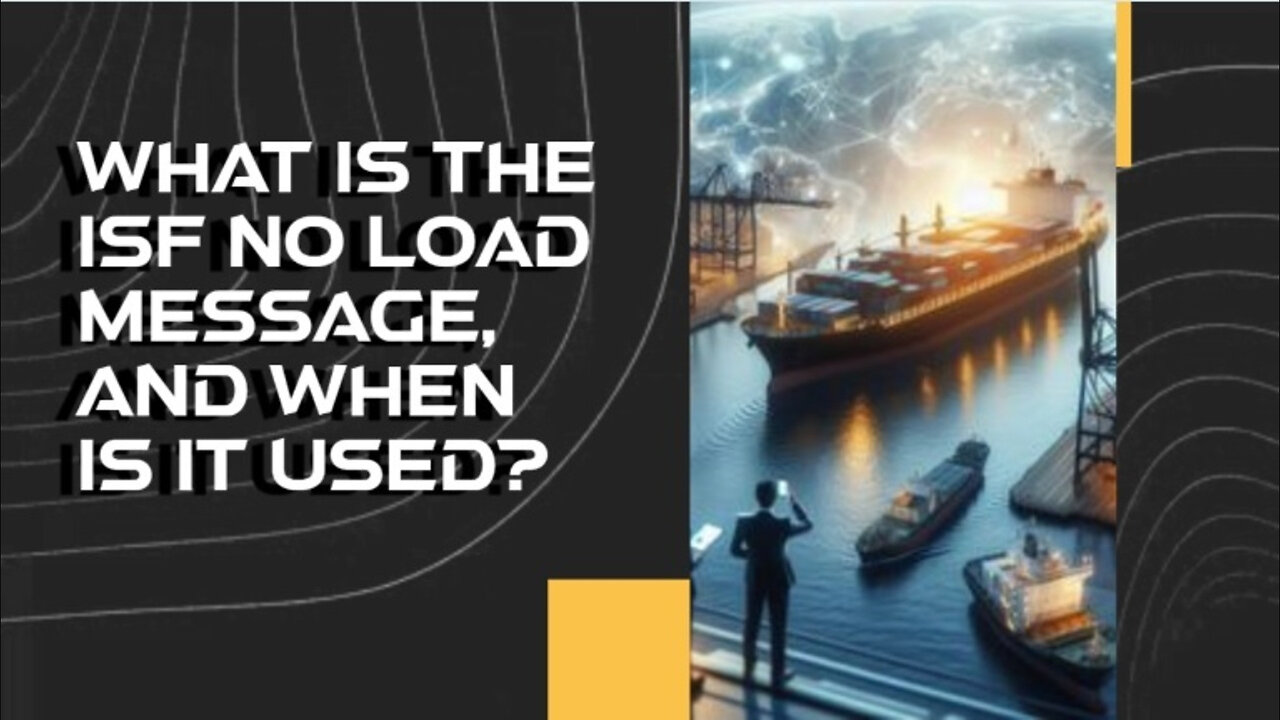Premium Only Content

Unlocking the Secrets of ISF: The No-Load Message Explained
ISF Cargo | Phone: 786-865-0459
Email: isf@isfcargo.com | https://isfcargo.com
In this video, we focus on the Importer Security Filing (ISF) No-Load Message, which is an important aspect of the ISF process. The ISF No-Load Message is used to inform U.S. Customs and Border Protection (CBP) when a container has not been loaded onto the intended vessel. We discuss the situations where this message may be relevant, such as overbooking or vessel changes, and emphasize the importance of timely submission to ensure compliance with CBP requirements. We also highlight the necessary information that should be included in the message, such as the Bill of Lading (BOL) number, the Container Freight Station (CFS) location, and the reason for not loading the container. Effective communication between all parties involved in the shipment is crucial for a smooth process and minimal delays. Ultimately, submitting the ISF No-Load Message accurately and promptly helps maintain compliance and facilitates the efficient movement of goods across borders.
#usimportbond
#isfcustomsbroker
#uscustomsclearing
#isfentry
Video Disclaimer Here: This content is for educational use and not associated with any US government body.
00:21 - Definition and Purpose: The ISF No-Load Message is a crucial component of the Importer Security Filing (ISF) process, used to inform U.S. Customs and Border Protection (CBP) when a cargo container has not been loaded onto the intended vessel, ensuring accurate tracking of import shipments.
01:23 - When to File: This message should be submitted promptly—ideally within 24 hours of the container's arrival at the port—whenever a decision is made not to load the container, due to reasons like overbooking or vessel changes.
01:42 - Required Information and Communication: The ISF No-Load Message must include specific details such as the Bill of Lading number, Container Freight Station location, and reason for the no-load situation. Effective communication with all parties involved is essential to facilitate compliance and minimize delays.
-
 4:52:32
4:52:32
Rotella Games
22 hours agoGrand Theft America - GTA IV | Day 1
54K5 -
 8:16:19
8:16:19
Joe Donuts Gaming
15 hours ago🟢Fortnite Live : Chill Vibes Lounge!
75.4K5 -
 38:43
38:43
Standpoint with Gabe Groisman
11 hours agoEp. 63. Terror Strikes the Nova Music Festival. Ofir Amir
144K49 -
 36:04
36:04
Forrest Galante
21 hours agoPrivate Tour of an Indian Billionaire’s Secret Wildlife Rescue Center
113K18 -
 9:37
9:37
Space Ice
1 day agoMorbius Is The Perfect Movie, Everyone Just Lied To You - Best Movie Ever
100K30 -
 17:09
17:09
Guns & Gadgets 2nd Amendment News
1 day agoWhy I Left The USCCA
88K44 -
 21:33
21:33
Degenerate Jay
2 days ago $3.25 earnedThe Best Video Game Movie Ever Made? Sonic The Hedgehog 3 Movie Review
75.4K3 -
 19:57
19:57
BlackDiamondGunsandGear
4 days agoIS 22LR ENOUGH?
102K31 -
 1:59:47
1:59:47
Anthony Rogers
1 day agoLIVE Comedy @ Cusumano's Pizza (Upstairs)
70.1K3 -
 5:02:46
5:02:46
MoFio23!
1 day agoNintendo Switch It UP Saturdays with The Fellas: LIVE - Episode #1
138K16